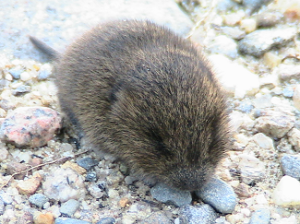Who’s Making Holes in My Garden?
By Chris Williams on July 2, 2015.

My garden has a lot of holes this year and I’ve seen some kind of little rodent chewing on my herbs. Are these just regular, old mice or are they moles? Should I put out mouse traps or poison? W. H., Boxborough, MA
Moles can leave some holes behind in their territory but they are rarely seen above ground and they do not feed on plants, they prefer earthworms! (see The Difference Between Moles and Voles). Your furry invaders could be white-footed mice or deer mice, but I’m betting that they are voles (see Mice or Voles in Your Yard?).
Because of their habits, voles are incorrectly called meadow mice or field mice. Voles are rodents but they are not mice. They look somewhat like chunky mice except that people think they are cuter, like little teddy bears. They are slightly larger than mice but have smaller ears, smaller eyes, and a short tail.
Voles Can Make a Mess of Gardens
Voles might be cute but they can cause a lot of damage to plants when they chew on roots, clip seedlings off at ground level, or pull up entire plants. They aren’t picky about what they eat as long as it’s plant material. Seeds, leaves, seedlings, root crops, bulbs, bark, fruits, and vegetables are all fair game. Vole damage isn’t just limited to garden plants in the summer months either (see Vole Winter Damage to Lawns and Trees).
Voles often use abandoned mole tunnels to travel from place to place and to feed on roots underground. They also travel above ground in runways through the grass. Vole nests are shallow underground chambers lined with grass or leaves, and with multiple ground openings, each 1-2 inches in diameter. They often nest at the base of plants after clipping off the roots below.
Vole populations tend to be cyclical, peaking every 2 to 5 years. This could be why you suddenly seem to have lots of holes and an overabundance of the little critters. You could also be contributing to an increase in the vole population if you have bird feeders with spilled seed on the ground.
Leave the Vole Control to Us
Don’t try to trap or poison the invaders until you have had a professional exterminator inspect and confirm that you are indeed dealing with voles. Moles would require a completely different strategy. One of our trained technicians can identify the critters, evaluate the problem, and recommend the best control solution. Give Colonial Pest a call today!
Needsmoreritalin at en.wikipedia [CC BY 3.0], from Wikimedia Commons